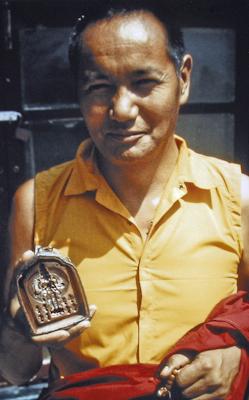water rushing
down a steep mountainside,
a natural force:
there is life
but the force
of dying
is there
driving.
Many people think I am crazy when I talk to them about death.
They think I don’t understand life.
‘If you talk about death and suffering
you make yourself miserable.’
They think I’m obsessed.
‘Dying is horrible.
Why do you dwell on it?’
Ridiculous.
They do not understand life.
we exist in a dance
between life and death:
a masked drama with one actor
changing character,
one face then another and another,
moving
changing.
From the first instant of life impermanence is with us.
From the moment of conception decay begins.
In the second moment of life a change has already occurred
and the first moment has disappeared. That is impermanence
and death.
‘I exist.’
‘I exist’ is a misconception.
a permanent-conception.
every energy is moving
changing, coming and going.
coming, then growing
old, older and dying
dying, dying.
When we see a dead body we never visualize our own corpse there.
‘Ah, it’s dead. Horrible.
I’m leaving now.’
We never think, ‘That’s me.’
There is no fear. Not understanding
that terrible corpse
is within you now.
all sense-world phenomena
exist like a cloud.
if there is a meeting
or beginning
or contact
there is naturally change
separation
and disappearance.
man and woman
friends mother father family
atoms
fire and water
things.
if there is a meeting
separation must follow
automatically. And there will be
clinging fear and suffering.
every imaginable super samsaric experience,
every contact,
every enjoyment
will disappear.
it’s natural.
but we are so insecure;
we find a friend and worry
that he will disappear.
we find a pleasure and worry
that it will end.
we are afraid to lose our home and money,
our loved ones
and our body.
we all fear separation,
and disappearance.
this is universal fear,
but it is useless,
creating only confusion.
it is not a solution;
it is dissolution.
Recently some people went on an expedition to Mount Everest.
They were successful and reached the summit, but on the way
down one man died. They tried to revive him, but it was
impossible.
Why did they go?
Milarepa said, ‘When worldly people see me they think I am
completely crazy. And, when I see worldly people I think they
are completely crazy.’
to choose coca-cola
when we could have champagne
is very stupid
isn’t it.
Our materialistic lives are devoted to temporal pleasures.
We think this is the best we can do, but when death comes we
end up with nothing and we die in misery.
There is not much difference between our way of life
and a dog’s life
except the potential
samsara never ends
because we don’t remember death.
‘Not today. No,
not today.’
life is only breath
coming in and going out.
if the breath goes out
and does not come in again
life is finished.
that is death.
until death we are going to think,
‘No. Not today.’
life is running:
death is definite
and we never know
when it will come.
Life passes like lightning; it is there, then it disappears.
But something in us believes death will come slowly—
our permanent-conception; because we do not remember death.
wisdom-memory
is the atomic energy
that destroys delusion,
but we forget.
we never think,
‘Death is definite
and we never know
when it will come.’
Since birth we have been collecting,
we collect friends,
we collect possessions, family, lovers, property,
this one and that one,
this and that.
We cling to each one,
and there is fear.
And when we die
not one of these things helps.
Instead of helping, our collection destroys us.
Because we did not remember death.
it will come,
definitely.
and the time
is never certain.
‘Ah, today I’m alive.
I’m all right.
Not today.’
why not?
‘Your father died today.’
O.K. It was time for him to die.
Everybody has to die.
Now that he is dead, it’s my turn.
Do you understand?
I must do something right now.
Like this: if I know that within ten days someone is going
to cut off my nose, but I don’t know who and I don’t when, I’m going to be
so careful; I’ll protect my nose as much as possible and not waste time putting on
make-up to make it beautiful.
We have this choice:
to die is a natural thing,
but it is possible to die
joyfully
like going home































